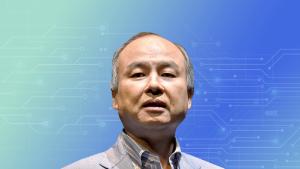SoftBank’s unicorn hunter How billionaire Masa Son is shaking up Silicon Valley By Seth Fiegerman
SoftBank’s unicorn hunter
How billionaire Masa Son is shaking up Silicon Valley
By Seth Fiegerman
Not far from the storied venture capital firms on Sand Hill Road, there’s a palatial estate where Masayoshi Son, Silicon Valley’s newest kingmaker, shapes the future. Reaching him requires driving into a leafy enclave filled with mansions overlooking Palo Alto before passing through a gated entrance into a sprawling compound where waiting attendants escort you inside.
Startup founders fortunate enough to earn an audience with Son, a 60-year old billionaire with a global network and vast funds, recall being led down a hallway lined with artwork to make the pitch of a lifetime. Some were ushered into a large conference room with an enormous table, spotless marble floors and ornate woodwork. Others found themselves in a small side room illuminated by chandeliers waiting for the meeting to begin. Eventually they met Son in an intimate sitting room where a two-seater couch faces a couple of chairs and a small coffee table.
Matt Barnard remembers time moving slowly in that side room as he awaited his chance to convince a man he described as “larger than life” to bet on his indoor farming startup, Plenty. To help make his case, Barnard brought along a seven-foot tower of mustard greens and bok choy grown by his startup. It was just tall enough, it turned out, to whack one of the chandeliers. “How perfect,” Barnard said. “I walk into this immaculate and impressive home and manage to almost break a chandelier.”
Son’s fund would go on to lead a $200 million investment round in Plenty after the meeting.
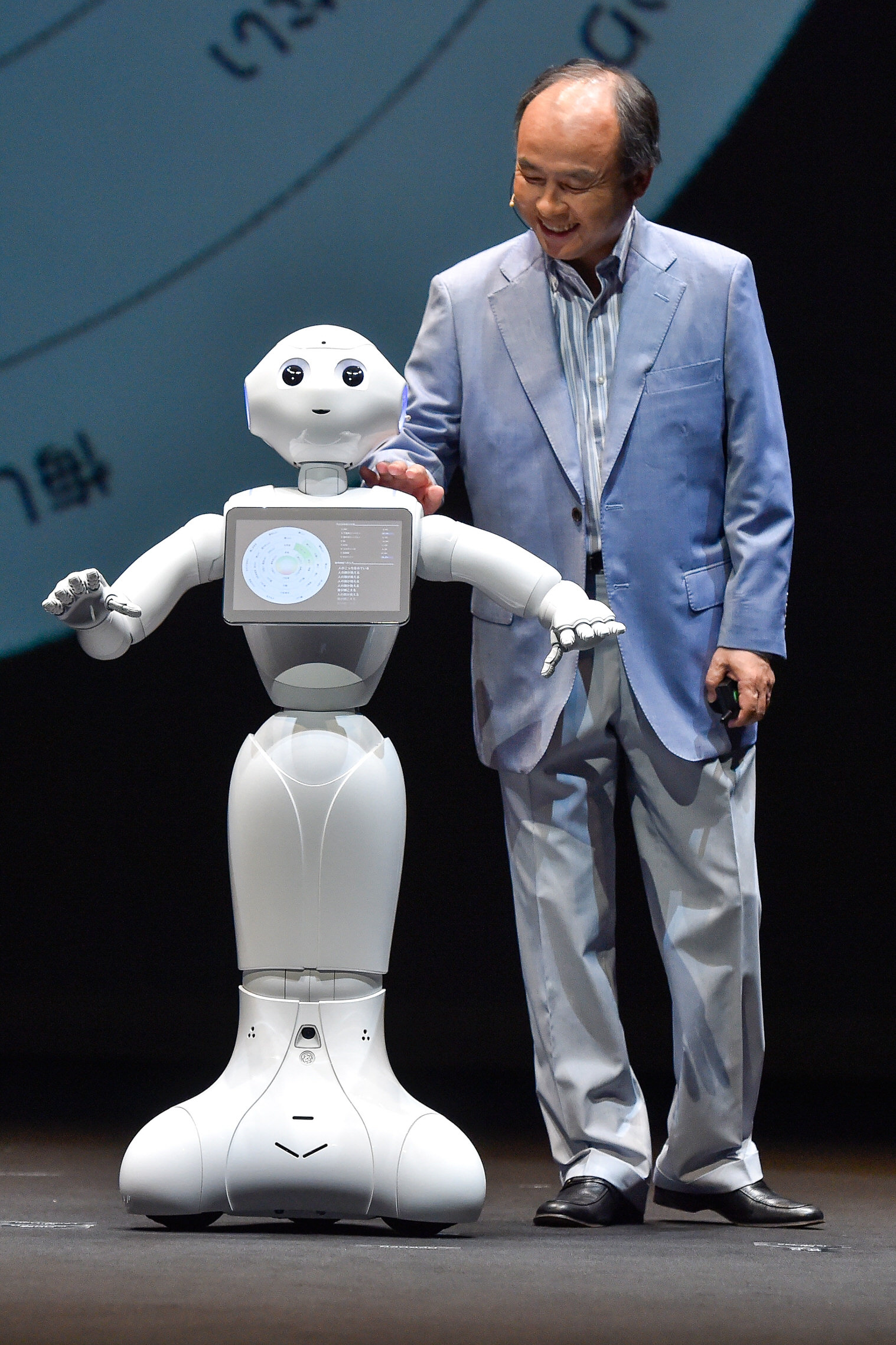
Son with Softbank’s humanoid robot, Pepper/Getty Images
Barnard wasn’t the only one to have an anxiety-inducing moment in the house. Mohit Aron, founder and CEO of the data storage startup Cohesity, remembers Son staying silent throughout much of his pitch. When Son did speak, it was to ask Aron how much bigger he thought the company might really grow with an infusion of capital. Aron told him it could one day capture much of the world’s data.
Son pondered that pitch for 30 seconds before saying “OK” and shaking Aron’s hand, sealing a deal to lead a $250 million investment round in the startup. The deal done, Son led Aron to the front door and bid him goodbye. “He is a man of few words,” Aron says. “He doesn’t say much. He will just shake hands and that’s it.”
The $100 Billion Gatekeeper
That’s how it is when you’re the visionary leader of SoftBank, one of the world’s most influential and aggressive technology firms. Under Son’s guidance, the Japanese conglomerate, which he founded in 1981, has repeatedly shaken up entire industries with blockbuster acquisitions of companies like Sprint and prescient investments in startups like Alibaba.
Son capitalized on the rise of personal computing in the 1980s and bet so heavily on the dot-com boom of the 1990s that he is said to have at one point owned 25% of the Internet. He lost billions in the dot-com bust, but sinking $20 million into Alibaba in 2000 helped revive his fortune. Son is now worth about $15 billion -- and, remarkably, maintains his tremendous appetite for risk and long-term thinking. At a time when most CEOs look no further ahead than the next quarter, Son forges ahead with a 300-year plan for his company.
At the heart of his plan lies the Vision Fund, a $93 billion pool of money that Son intends to use to shape the future for centuries to come.
If that kind of timeline seems odd, well, Son is something of an eccentric. He often quotes Yoda, passionately prepares for the singularity, and has been known to make big bets on companies based upon what he once called his “sense of smell.” He plays an active role in SoftBank’s investment decisions, and Aron recalled being told that Son has “final say” on each Vision Fund deal.
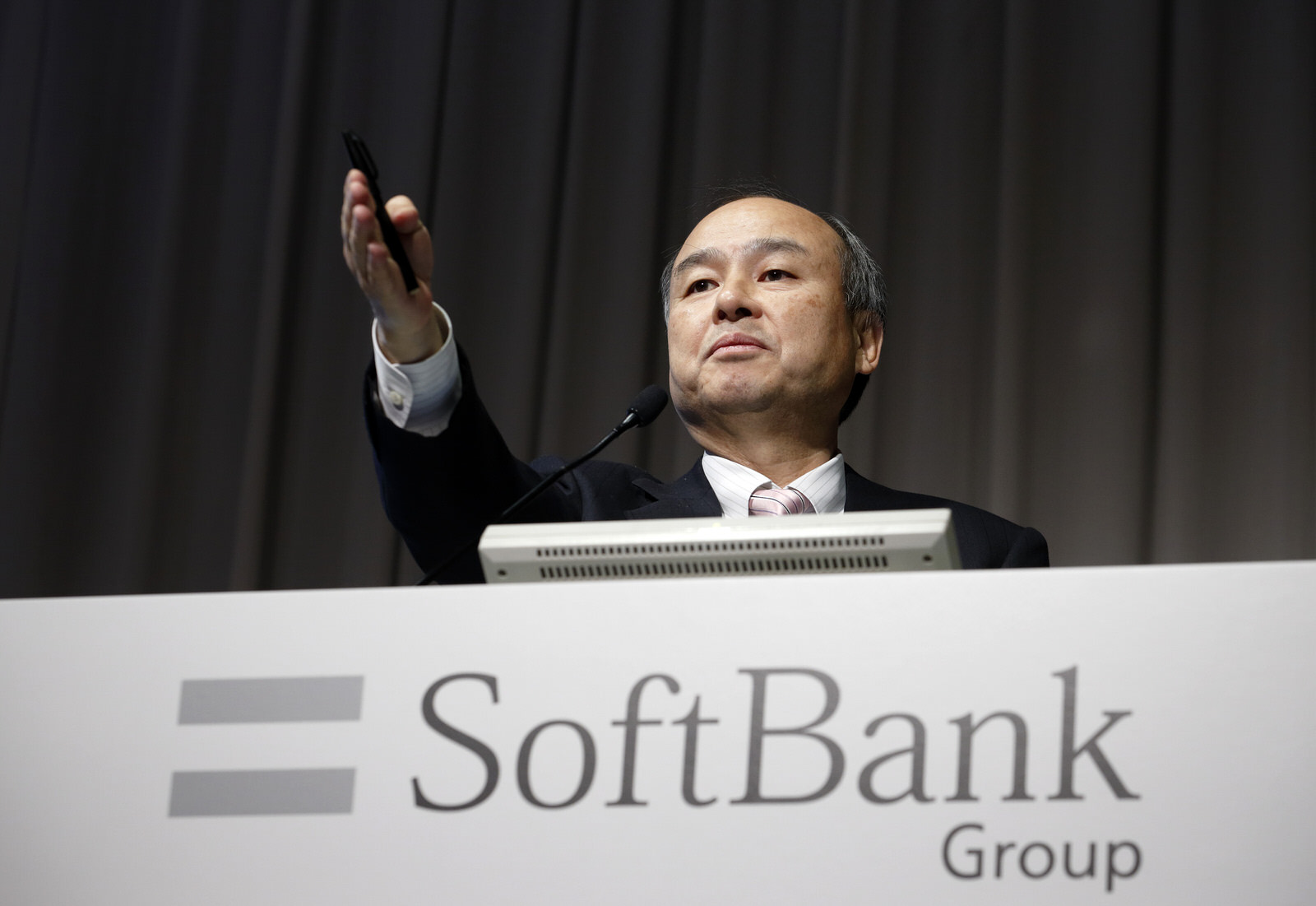
Son at a 2016 press conference/Getty Images
That’s not entirely true, according to a spokesperson for SoftBank Investment Advisors. Son sits on an investment committee that performs a final review of potential investments. Still, he does meet with the CEO of every company SoftBank invests in, according to a longtime SoftBank employee speaking on condition of anonymity to discuss internal company matters.
Such meetings have grown increasingly frequent since last year, when Son launched the Vision Fund to invest in technology startups that he believes will fundamentally change the world. The fund, backed by the likes of Apple and Saudi Arabia’s Public Investment Fund, has already pumped $30 billion into companies including Uber, WeWork, and Slack.
Not everyone celebrates this. Rival venture capitalists complain that Son and his immense VC fund wield an unprecedented ability to inflate startup valuations and pressure companies to take money they may not need -- or want. And they know Son is only getting started. During SoftBank’s annual shareholder meeting in June, Son said he plans to devote "97% of my time and brain" to investing in technology companies.
SoftBank, he said, is now “a unicorn hunter.”
The rise, fall and rise of Mr. Internet
Son has always had a penchant for making deals. As a student studying economics at UC-Berkeley forty years ago, he convinced Forrest Mozer, a professor who had invented a talking calculator for the blind, to join him in building a pocket translator.
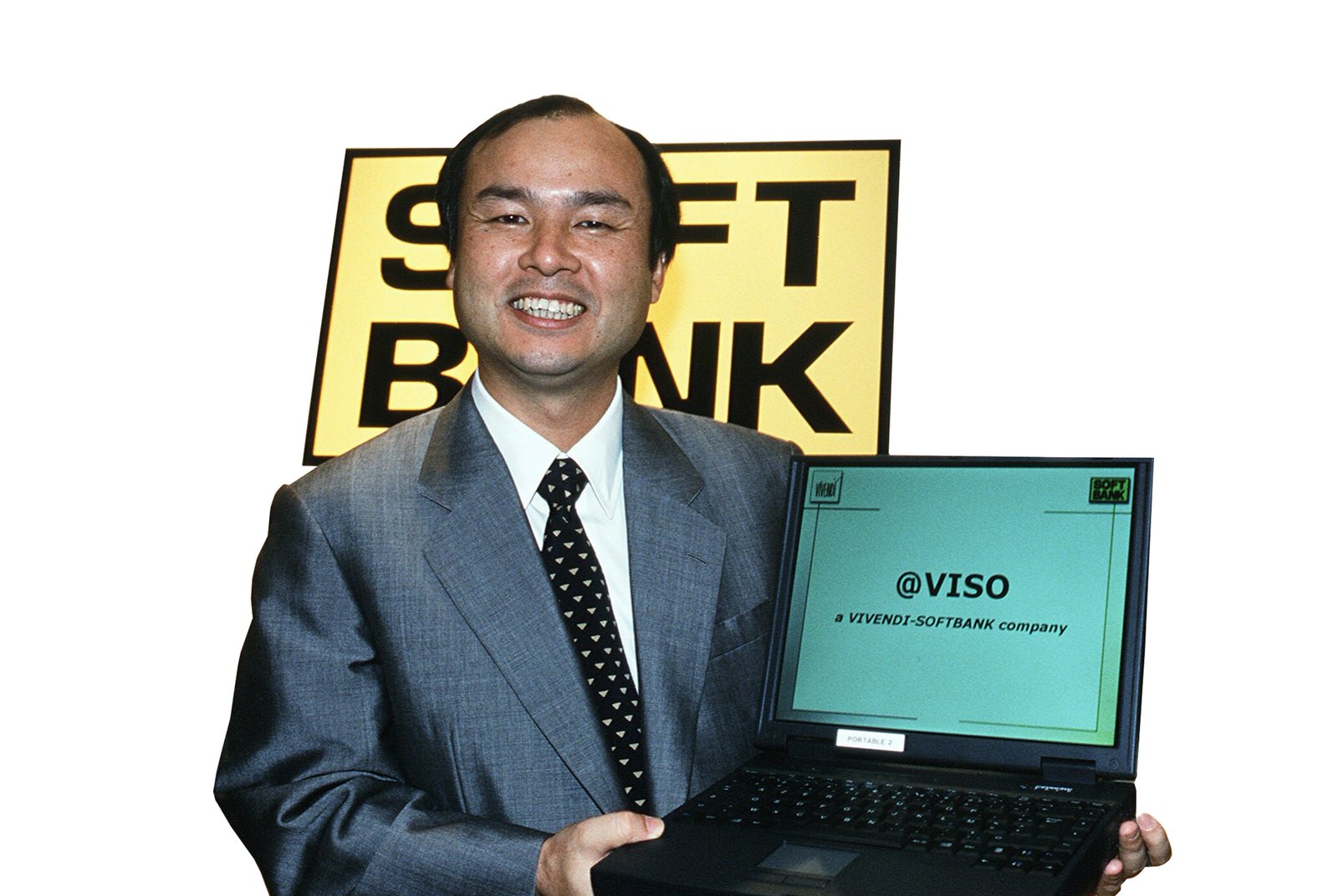
Son in 1999/Getty Images
“It surprised me,” Mozer told CNN recently. “Here’s this young, little kid coming into my office with a business plan that really made a lot of sense. I went home and told my wife that I just met this guy who is going to own Japan someday. It turned out I was more right than I thought.”
Son sold the device to Sharp in a deal he said netted him “close to $1 million” -- an early win for the young entrepreneur. “It was clear if you spent an hour a day with him that his mind was all on business,” Mozer says.
Son returned to Japan after graduating from Berkeley in 1980 and founded SoftBank --the name is short for “bank of software”-- in 1981. It focused on distributing software developed by other companies, before branching into computer trade shows and tech magazines. From the start, Son focused on “how he could help change society with technology,” said the longtime SoftBank employee.
By the mid-90s, it seemed clear that answering that question meant investing in online companies. In what could be seen as a precursor to its activities today, SoftBank pumped billions into hundreds of internet startups. Some, like Yahoo and Alibaba, paid off handsomely, helping overshadow losses from notable flops like Kozmo and Webvan. Son bet so heavily on online ventures that people took to calling him “Mr. Internet.”
Son’s net worth soared accordingly, only to collapse when the bubble burst. He is widely reported to have seen his paper wealth fall by $70 billion in 2000. “One year before that, my personal net worth was increasing $10 billion per week. For three days, I became richer than Bill Gates,” Son told Bloomberg TV last year. “Before I told anybody else, our stock started crashing… We almost went bankrupt. Somehow. I survived.”
SoftBank declined to make Son available for this article.
Son started rebuilding immediately. “When something like that happens he doesn’t sit back and sulk and become inward looking,” the longtime SoftBank employee said. Son looked to new opportunities, including investing in broadband services in the early 2000s, acquiring Sprint for $20 billion in 2013 and buying multiple robotics companies in 2017 -- among them Alphabet’s Boston Dynamics, which builds robots that run, jump and climb stairs. More than a decade after the Dot Com bubble burst, SoftBank reaped the financial rewards of the early Alibaba deal. When the Chinese e-commerce company went public in 2014, SoftBank’s $20 million investment was worth nearly $75 billion.
Mr. Internet was back, and more ambitious than ever.
“He likes to joke he has had more failures than anyone else, but has learned from all of them,” says Chris Lane, an analyst with Bernstein who tracks SoftBank. “Most people still admire his track record, and the amazing success he has had despite these setbacks.”
A Bridge Too Far
Yet some in Silicon Valley worry SoftBank’s massive investments could create a venture funding arms race and allow unprofitable startups to keep chugging along with questionable business models. And several investors told CNNMoney that SoftBank is driving up valuations for everybody.
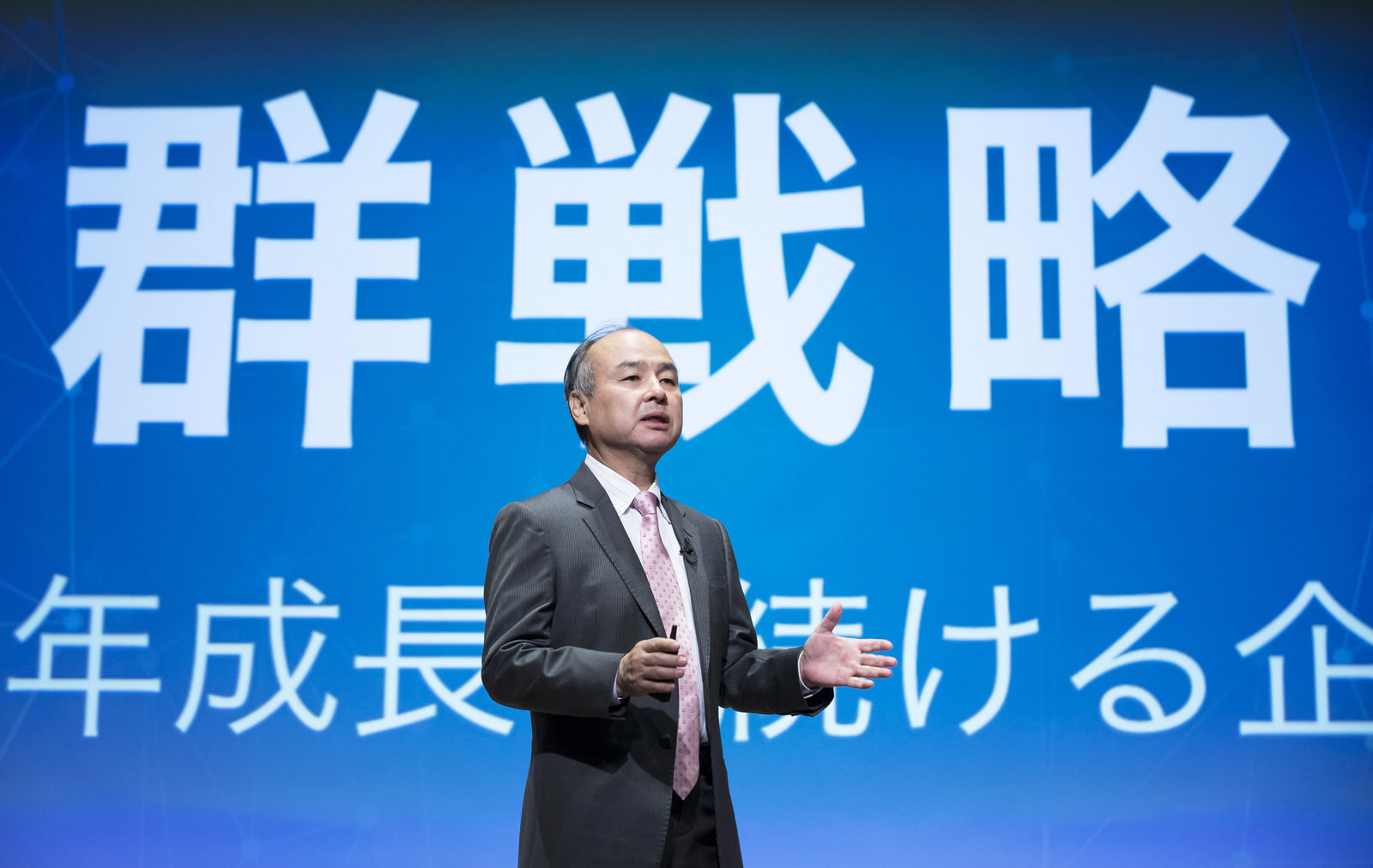
Son earlier this year/Getty Images
Scott Sandell, managing partner at New Enterprise Associates, said he was “very close” to sealing a $30 million investment in a startup at a $180 million valuation. But “Masa swooped in” and offered the startup $100 million at a $500 million valuation. “The entrepreneur, who was very favorable toward us, basically couldn’t say no,” Sandell said.
It’s certainly not news that one investor can push another aside, but most of them can’t brandish a $100 billion checkbook. Multiple investors said startups may feel pressure to accept SoftBank’s funding regardless of whether they want it, simply to prevent SoftBank from handing that money to a rival and upending the market. Son appeared to play that card very publicly last year. During his negotiations with Uber, Son casually told reporters that he’d be just as happy investing in Lyft instead.
“I think they’ve completely changed the dialogue, for better or for worse,” said Dan O’Keefe, managing partner at Apax Digital, a growth equity fund. “There’s no one not talking about them. Everyone is trying to figure out how it might impact their subset of the market.”
All of this aside, Son faces a deeper question: Can he invest in enough winners to generate the kind of returns that make his $100 billion experiment worthwhile for investors? Doing so means surpassing the performance of major indices like the S&P 500, which gained 19% in 2017, says Steven Kaplan, who teaches entrepreneurship and finance at the University of Chicago Booth School of Business.
“You can’t argue with the fact that he’s been successful in the past,” Kaplan said. “I just think $100 billion is a bridge too far.”
Number One Strategy
Son laid out his plan for crossing that bridge during the shareholder meeting in June. He called it his “cluster of number one strategy” -- investing in unicorns that are, or could be, “the number one players in the market.”
Near the top of that list is WeWork, an eight-year-old startup that provides trendy coworking spaces in 80 cities worldwide. SoftBank invested $4.4 billion in WeWork last year, despite the fact the company wasn’t actively seeking funding. Now estimated to have a $20 billion valuation, some critics have called WeWork overvalued, but not Son.
“This company,” he told shareholders, “is ready to become next Alibaba.” The choice to namedrop his most famous investment may say as much about the pressure on Son to find yet another Alibaba-sized opportunity as it does about his actual enthusiasm for WeWork. The Alibaba deal is arguably the signature achievement of his career. But Son’s future as an investor may depend on proving, as he once put it, that his success with Alibaba “was not just one lucky hit.”
It’s been barely a year since the Vision Fund officially launched, but, SoftBank has scored some modest wins with the Vision Fund. It invested $2.5 billion in Flipkart, India’s leading online retailer, in 2017. That investment yielded a 60% return when Walmart bought the company less than a year later in a deal that reportedly pegged SoftBank’s stake at $4 billion. And then there’s Uber, which SoftBank first invested in when the ride-hailing company was valued at $48 billion. Uber is believed to be pursuing a secondary stock sale at a $62 billion valuation -- with plans to go public next year.
Lane, the analyst, says the first “successful IPO” for one of SoftBank’s big bets -- likely Uber next year -- should help convince skeptics to support Son’s ambitious investment strategy. But a quick payday from a blockbuster IPO falls short of Son’s towering rhetoric. By his own account, Son is laying the foundation for a company, and, by extension, a personal legacy, that endures for centuries.
“In 300 years’ time, we would like to become that company that makes the most contribution to human evolution -- the company that has greatest impact on humanity,” he said during a recent shareholder meeting.
To achieve that grandiose goal, Son continues pursuing bold, almost brash, deals designed to keep SoftBank at the center of any trend he believes will fundamentally shape world. In the past, that meant telecoms and internet firms. Today it means big data, biotechnology, robotics, agriculture, ride-hailing and autonomous vehicles. Son likes to say he is preparing for the day when “all sectors of society and industry will be redefined” by super-intelligent machines.
Son’s conversations with founders reflect that abiding desire to reshape the world. Eric Gundersen, the CEO of the open source mapping startup Mapbox, says Son didn’t even mention maps during a discussion that led to Vision Fund leading a $164 million investment round. Instead, Son focused on how new modes of transportation will shape the design and construction of cities.
During that conversation, Gundersen experienced first-hand what it’s like to engage with a CEO and investor who thinks on a 300-year timetable. He marveled at how Son was able to discuss ideas that were “multi-decades out” before going back to “specific customers” and industry details in the present.
“You can’t have a visionary strategy unless you know the details,” Gundersen said. And he has an idea what Son’s visionary strategy is. “You’re seeing him own the infrastructure for the future.”
News Courtesy: www.cnn.com

